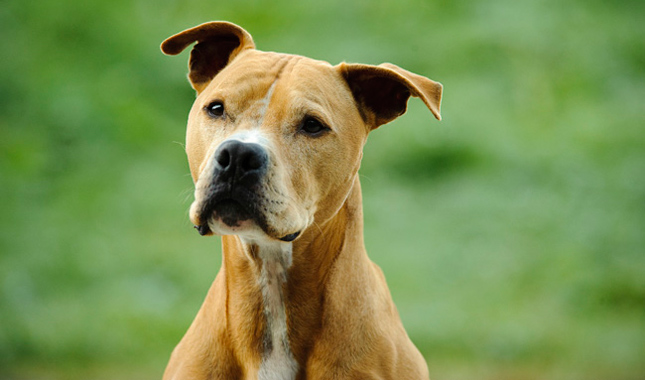Vizsla
Published on June 27, 2011
Skip To
Breed Details
- Height: 21 to 24 inches at the shoulder
- Weight: 50 to 65 pounds
Breed Characteristics
Adaptability
Trainability
Grooming
Apartament Friendly
Child Friendly
Shedding Level
Dog Friendly
Exercise Needs
Territorial
Barking Tendencies
Health Issues
Social Needs
Energy Level
Affectionate
Watchdog Instincts
Cat Friendly
Intelligence
Stranger Friendly
This highly energetic Hungarian favorite can do it all with style and grace: He’s not only a talented hunting dog, but he’s also capable of excelling in many other fields, including agility and search and rescue work.If you’re looking for a more exotic variation of the Pointer, the Vizsla is your dog — especially if you intend to spend a lot of time with him, and give him plenty of opportunity to run, hike, walk, and play hard every day. This is an active, people-oriented dog who needs a great deal of exercise to avoid becoming bored and destructive. He also thrives on gentle, consistent training from an early age to develop good habits and avoid bad ones, such as digging. His worst fear: being separated from his family, which means he absolutely can’t live in the yard.
The Vizsla is a sleek dog with long ears framing his chiseled face, and eyes that match the rich, copper tone of his coat. Aside from shedding a bit, his grooming needs are basic: A weekly brushing, occasional nail trims, and regular cleaning of the ears and brushing of his teeth.
Smaller in size to the similarly built Weimaraner, female Vizslas weigh between 40 and 55 pounds, while males can reach up to 65 pounds. This makes them a good choice for families who want a dog that’s big, but not too big. And speaking of families, Vizslas tend to be great with children, although they can be untrustworthy around pet cats. If you bring a Vizsla into your home, be prepared to give him the guidance, attention, and love he needs to be a part of your family.
Vizslas also served as messenger dogs during World War I, but the privations of the era nearly put an end to the breed — and they didn’t fare much better during World War II. Luckily, their fans managed to save the Vizsla from extinction, and Americans began taking an interest in the breed in the 1950s. In 1960, the American Kennel Club officially recognized the Vizsla.
Today, Vizslas are more than just hunting dogs and companions. Some work as guide dogs, drug-detection canines, and search and rescue dogs. The Vizsla ranks 41st among the breeds registered by the AKC, up from 47th a decade ago.
Vizsla puppies are rambunctious, so they should be supervised at all times. Although they love kids, they view them as other puppies, so they can mouth and bite small children, take their toys, and knock them down. The Vizsla learns quickly if he’s properly rewarded with praise, affection, and treats. He’s sensitive and wants to please, so avoid disciplining him with harsh actions or a loud voice.
Start training your puppy the day you bring him home — he’s capable of soaking up a great deal of information even at seven weeks old. If possible, get him into puppy kindergarten class by the time he is 10 to 12 weeks old, and socialize, socialize, socialize. However, be aware that many puppy training classes require certain vaccines (like kennel cough) to be up to date, and many veterinarians recommend limited exposure to other dogs and public places until puppy vaccines (including rabies, distemper and parvovirus) have been completed. In lieu of formal training, you can begin training your puppy at home and socializing him among family and friends until puppy vaccines are completed.
As hunting dogs, Vizslas mature early and are capable of pointing and retrieving before they are a year old. They are versatile hunters because they not only point, but also retrieve on land and from the water. In the field, they stay close to the hunter and maintain a deliberate pace, using their expert nose to sniff out pheasant, woodcock, and ruffed grouse. Vizslas also have an excellent memory and are noted for their ability to remember and pinpoint the best spots for finding birds.
Other optional CHIC test results that can be submitted include a PennHip evaluation of a Vizsla’s hips (for hip dysplasia), an OFA evaluation for sebaceous adenitis (an inflammatory skin condition that damages the hair follicle), and a Cornell University blood assay for von Willebrand’s disease. The VCA also encourages Vizsla owners to submit DNA from dogs with lymphosarcoma in the hope that researchers can eventually find a genetic component for the disease. Blood samples are stored with the CHIC DNA registry.
Not all of these conditions are detectable in a growing puppy, and it can be hard to predict whether an animal will be free of these maladies, which is why you must find a reputable breeder who is committed to breeding the healthiest animals possible. They should be able to produce independent certification that the parents of the dog (and grandparents, etc.) have been screened for genetic defects and deemed healthy for breeding. That’s where health registries come in.
Careful breeders screen their dogs for genetic disease, and only breed the best-looking specimens, but sometimes Mother Nature has other ideas and a puppy can develop one of these diseases. In most cases, he can still live a good life, thanks to advances in veterinary medicine. And remember that you have the power to protect your Vizsla from one of the most common health problems: obesity. Keeping him at an appropriate weight is a simple way to extend your Vizsla’s life.
The rest is basic care: Keep his ears clean and dry (clean weekly with a vet-approved cleaning solution), and trim the nails as needed, usually every week or two. And brush his teeth with a vet-approved pet toothpaste for good overall health and fresh breath.
Lots of breeders have websites, so how can you tell who’s good and who’s not? Red flags to look out for: multiple litters on the premises, puppies always being available, having your choice of any puppy, and being offered the option to pay online with a credit card. Breeders who sell puppies at a lower price “without papers” are unethical and should be reported to the American Kennel Club. You should also bear in mind that buying a puppy from a website that offers to ship the dog immediately can be a risky venture — it leaves you no recourse if what you get isn’t exactly what you expected.
To start your search, check out the website of the Vizsla Club of America (VCA) and choose a breeder who has agreed to abide by the club’s code of ethics, which specifies that members not place puppies prior to 12 weeks of age, prohibits the sale of puppies through pet stores, and calls for the breeder to obtain recommended health clearances before breeding.
Whether you’re planning to get your new best friend from a breeder, a pet store, or another source, don’t forget that old adage “let the buyer beware”. Disreputable breeders and facilities that deal with puppy mills can be hard to distinguish from reliable operations. There’s no 100% guaranteed way to make sure you’ll never purchase a sick puppy, but researching the breed (so you know what to expect), checking out the facility (to identify unhealthy conditions or sick animals), and asking the right questions can reduce the chances of heading into a disastrous situation. And don’t forget to ask your veterinarian, who can often refer you to a reputable breeder, breed rescue organization, or other reliable source for healthy puppies.
The cost of a Vizsla puppy varies depending on the breeder’s locale, the sex of the puppy, the titles that the puppy’s parents have, and whether the puppy is best suited for the show ring or a pet home. Puppies should be temperament tested, vetted, dewormed, and socialized to give them a healthy, confident start in life. If you put as much effort into researching your puppy as you would when buying a new car, it will save you money in the long run.
Before you decide to buy a puppy, consider whether an adult Vizsla may better suit your lifestyle. Puppies are loads of fun, but they require a good deal of time and effort before they grow up to be the dog of your dreams. An adult may already have some training, and he’ll probably be less active, destructive, and demanding than a puppy.
With an adult, you know more about what you’re getting in terms of personality and health and you can find adults through breeders or shelters. If you are interested in acquiring an older dog through breeders, ask them about purchasing a retired show dog or if they know of an adult dog who needs a new home. If you want to adopt a dog, read the advice below on how to do that.
1. Use the Web
Sites like Petfinder.com and Adopt-a-Pet.com can have you searching for a Vizsla in your area in no time flat. The site allows you to be very specific in your requests (housetraining status, for example) or very general (all the Vizslas available on Petfinder across the country). AnimalShelter.org can help you find animal rescue groups in your area. Also some local newspapers have “pets looking for homes” sections you can review.
Social media is another great way to find a dog. Post on your Facebook page that you are looking for a specific breed so that your entire community can be your eyes and ears.
2. Reach Out to Local Experts
Start talking with all the pet pros in your area about your desire for a Vizsla. That includes vets, dog walkers, and groomers. When someone has to make the tough decision to give up a dog, that person will often ask her own trusted network for recommendations.
3. Talk to Breed Rescue
Most people who love Vizslas love all Vizslas. That’s why breed clubs have rescue organizations devoted to taking care of homeless dogs. The Vizsla Club of America’s rescue network can help you find a dog that may be the perfect companion for your family. You can also search online for other Vizsla rescues in your area.
The great thing about breed rescue groups is that they tend to be very upfront about any health conditions the dogs may have and are a valuable resource for advice. They also often offer fostering opportunities so, with training, you could bring a Vizsla home with you to see what the experience is like.
4. Key Questions to Ask
You now know the things to discuss with a breeder, but there are also questions you should discuss with shelter or rescue group staff or volunteers before you bring home a dog. These include:
What is his energy level?
How is he around other animals?
How does he respond to shelter workers, visitors, and children?
What is his personality like?
What is his age?
Is he housetrained?
Has he ever bitten or hurt anyone that they know of?
Are there any known health issues?
Wherever you acquire your Vizsla, make sure you have a good contract with the seller, shelter or rescue group that spells out responsibilities on both sides. Petfinder offers an Adopters Bill of Rights that helps you understand what you can consider normal and appropriate when you get a dog from a shelter. In states with “puppy lemon laws,” be sure you and the person you get the dog from both understand your rights and recourses.
Puppy or adult, take your Vizsla to your veterinarian soon after adoption. Your veterinarian will be able to spot problems, and will work with you to set up a preventive regimen that will help you avoid many health issues.
The Vizsla is a sleek dog with long ears framing his chiseled face, and eyes that match the rich, copper tone of his coat. Aside from shedding a bit, his grooming needs are basic: A weekly brushing, occasional nail trims, and regular cleaning of the ears and brushing of his teeth.
Smaller in size to the similarly built Weimaraner, female Vizslas weigh between 40 and 55 pounds, while males can reach up to 65 pounds. This makes them a good choice for families who want a dog that’s big, but not too big. And speaking of families, Vizslas tend to be great with children, although they can be untrustworthy around pet cats. If you bring a Vizsla into your home, be prepared to give him the guidance, attention, and love he needs to be a part of your family.
Other Quick Facts
- The name is pronounced VEEZH-la or VEESH-la.
- Vizslas need 30 minutes to an hour of vigorous exercise every day, and they excel at brain games, such as puzzle toys.
- With the exception of the Brittany, the Vizsla is the smallest of the versatile hunting dogs.
- They are used to hunt rabbits and upland game — pheasant, grouse, partridge, and turkey — as well as to retrieve waterfowl.
- Vizslas are protective and make excellent watchdogs.
The History of Vizslas
The Vizsla was developed in Hungary as a hunting dog capable of pointing and retrieving. One of the most interesting tidbits about the Vizsla’s past is that he once hunted in partnership with falcons — the Vizsla would point and flush out the bird for the falcon, who would then dive and bring it to earth.Vizslas also served as messenger dogs during World War I, but the privations of the era nearly put an end to the breed — and they didn’t fare much better during World War II. Luckily, their fans managed to save the Vizsla from extinction, and Americans began taking an interest in the breed in the 1950s. In 1960, the American Kennel Club officially recognized the Vizsla.
Today, Vizslas are more than just hunting dogs and companions. Some work as guide dogs, drug-detection canines, and search and rescue dogs. The Vizsla ranks 41st among the breeds registered by the AKC, up from 47th a decade ago.
Vizsla Temperament and Personality
People adore the Vizsla for his devoted, affectionate nature and infectious enthusiasm for life. He’s lively and gentle, but he’s also fearless and more protective than the average Sporting dog, making him a stellar watchdog. To help him channel some of that boundless energy, he should have access to a large patch of grass where he can safely run off leash every day.Vizsla puppies are rambunctious, so they should be supervised at all times. Although they love kids, they view them as other puppies, so they can mouth and bite small children, take their toys, and knock them down. The Vizsla learns quickly if he’s properly rewarded with praise, affection, and treats. He’s sensitive and wants to please, so avoid disciplining him with harsh actions or a loud voice.
Start training your puppy the day you bring him home — he’s capable of soaking up a great deal of information even at seven weeks old. If possible, get him into puppy kindergarten class by the time he is 10 to 12 weeks old, and socialize, socialize, socialize. However, be aware that many puppy training classes require certain vaccines (like kennel cough) to be up to date, and many veterinarians recommend limited exposure to other dogs and public places until puppy vaccines (including rabies, distemper and parvovirus) have been completed. In lieu of formal training, you can begin training your puppy at home and socializing him among family and friends until puppy vaccines are completed.
As hunting dogs, Vizslas mature early and are capable of pointing and retrieving before they are a year old. They are versatile hunters because they not only point, but also retrieve on land and from the water. In the field, they stay close to the hunter and maintain a deliberate pace, using their expert nose to sniff out pheasant, woodcock, and ruffed grouse. Vizslas also have an excellent memory and are noted for their ability to remember and pinpoint the best spots for finding birds.
What You Need to Know About Vizsla Health
Health problems that can affect Vizslas include epilepsy; blood clotting disorders (von Willebrand’s disease, hemophilia); eye disorders (entropion, cataracts, progressive retinal atrophy); hip dysplasia; hypothyroidism; and cancers including lymphosarcoma and hemangiosarcoma. The Vizsla Club of America (VCA) participates in the Canine Health Information Center (CHIC), a health database. Before Vizslas can be issued a CHIC number, breeders must submit hip and thyroid evaluations from the Orthopedic Foundation for Animals (OFA) and eye test results from the Canine Eye Registration Foundation (CERF). Breeders must agree to have all test results, positive or negative, published in the CHIC database, which can be accessed by anyone who wants to check the health of a puppy’s parents.Other optional CHIC test results that can be submitted include a PennHip evaluation of a Vizsla’s hips (for hip dysplasia), an OFA evaluation for sebaceous adenitis (an inflammatory skin condition that damages the hair follicle), and a Cornell University blood assay for von Willebrand’s disease. The VCA also encourages Vizsla owners to submit DNA from dogs with lymphosarcoma in the hope that researchers can eventually find a genetic component for the disease. Blood samples are stored with the CHIC DNA registry.
Not all of these conditions are detectable in a growing puppy, and it can be hard to predict whether an animal will be free of these maladies, which is why you must find a reputable breeder who is committed to breeding the healthiest animals possible. They should be able to produce independent certification that the parents of the dog (and grandparents, etc.) have been screened for genetic defects and deemed healthy for breeding. That’s where health registries come in.
Careful breeders screen their dogs for genetic disease, and only breed the best-looking specimens, but sometimes Mother Nature has other ideas and a puppy can develop one of these diseases. In most cases, he can still live a good life, thanks to advances in veterinary medicine. And remember that you have the power to protect your Vizsla from one of the most common health problems: obesity. Keeping him at an appropriate weight is a simple way to extend your Vizsla’s life.
The Basics of Vizsla Grooming
A Vizsla’s grooming routine is about as easy as it gets. Brush the short, smooth coat weekly with a rubber curry brush or a firm bristle brush to distribute skin oils and keep the coat gleaming. Baths are rarely necessary; four to five times a year is plenty.The rest is basic care: Keep his ears clean and dry (clean weekly with a vet-approved cleaning solution), and trim the nails as needed, usually every week or two. And brush his teeth with a vet-approved pet toothpaste for good overall health and fresh breath.
Finding a Vizsla
Whether you want to go with a breeder or get your dog from a shelter or rescue, here are some things to keep in mind.Choosing a Vizsla Breeder
Selecting a respected breeder is a great way to find the right puppy. Reputable breeders will welcome questions about temperament and health clearances, as well as explain the history of the breed and what kind of puppy makes for a good pet. Don’t be shy about describing exactly what you’re looking for in a dog — breeders interact with their puppies daily and can make accurate recommendations once they know something about your lifestyle and personality.Lots of breeders have websites, so how can you tell who’s good and who’s not? Red flags to look out for: multiple litters on the premises, puppies always being available, having your choice of any puppy, and being offered the option to pay online with a credit card. Breeders who sell puppies at a lower price “without papers” are unethical and should be reported to the American Kennel Club. You should also bear in mind that buying a puppy from a website that offers to ship the dog immediately can be a risky venture — it leaves you no recourse if what you get isn’t exactly what you expected.
To start your search, check out the website of the Vizsla Club of America (VCA) and choose a breeder who has agreed to abide by the club’s code of ethics, which specifies that members not place puppies prior to 12 weeks of age, prohibits the sale of puppies through pet stores, and calls for the breeder to obtain recommended health clearances before breeding.
Whether you’re planning to get your new best friend from a breeder, a pet store, or another source, don’t forget that old adage “let the buyer beware”. Disreputable breeders and facilities that deal with puppy mills can be hard to distinguish from reliable operations. There’s no 100% guaranteed way to make sure you’ll never purchase a sick puppy, but researching the breed (so you know what to expect), checking out the facility (to identify unhealthy conditions or sick animals), and asking the right questions can reduce the chances of heading into a disastrous situation. And don’t forget to ask your veterinarian, who can often refer you to a reputable breeder, breed rescue organization, or other reliable source for healthy puppies.
The cost of a Vizsla puppy varies depending on the breeder’s locale, the sex of the puppy, the titles that the puppy’s parents have, and whether the puppy is best suited for the show ring or a pet home. Puppies should be temperament tested, vetted, dewormed, and socialized to give them a healthy, confident start in life. If you put as much effort into researching your puppy as you would when buying a new car, it will save you money in the long run.
Before you decide to buy a puppy, consider whether an adult Vizsla may better suit your lifestyle. Puppies are loads of fun, but they require a good deal of time and effort before they grow up to be the dog of your dreams. An adult may already have some training, and he’ll probably be less active, destructive, and demanding than a puppy.
With an adult, you know more about what you’re getting in terms of personality and health and you can find adults through breeders or shelters. If you are interested in acquiring an older dog through breeders, ask them about purchasing a retired show dog or if they know of an adult dog who needs a new home. If you want to adopt a dog, read the advice below on how to do that.
Adopting a Dog From a Vizsla Rescue or Shelter
There are many great options available if you want to adopt a dog from an animal shelter or breed rescue organization. Here is how to get started.1. Use the Web
Sites like Petfinder.com and Adopt-a-Pet.com can have you searching for a Vizsla in your area in no time flat. The site allows you to be very specific in your requests (housetraining status, for example) or very general (all the Vizslas available on Petfinder across the country). AnimalShelter.org can help you find animal rescue groups in your area. Also some local newspapers have “pets looking for homes” sections you can review.
Social media is another great way to find a dog. Post on your Facebook page that you are looking for a specific breed so that your entire community can be your eyes and ears.
2. Reach Out to Local Experts
Start talking with all the pet pros in your area about your desire for a Vizsla. That includes vets, dog walkers, and groomers. When someone has to make the tough decision to give up a dog, that person will often ask her own trusted network for recommendations.
3. Talk to Breed Rescue
Most people who love Vizslas love all Vizslas. That’s why breed clubs have rescue organizations devoted to taking care of homeless dogs. The Vizsla Club of America’s rescue network can help you find a dog that may be the perfect companion for your family. You can also search online for other Vizsla rescues in your area.
The great thing about breed rescue groups is that they tend to be very upfront about any health conditions the dogs may have and are a valuable resource for advice. They also often offer fostering opportunities so, with training, you could bring a Vizsla home with you to see what the experience is like.
4. Key Questions to Ask
You now know the things to discuss with a breeder, but there are also questions you should discuss with shelter or rescue group staff or volunteers before you bring home a dog. These include:
What is his energy level?
How is he around other animals?
How does he respond to shelter workers, visitors, and children?
What is his personality like?
What is his age?
Is he housetrained?
Has he ever bitten or hurt anyone that they know of?
Are there any known health issues?
Wherever you acquire your Vizsla, make sure you have a good contract with the seller, shelter or rescue group that spells out responsibilities on both sides. Petfinder offers an Adopters Bill of Rights that helps you understand what you can consider normal and appropriate when you get a dog from a shelter. In states with “puppy lemon laws,” be sure you and the person you get the dog from both understand your rights and recourses.
Puppy or adult, take your Vizsla to your veterinarian soon after adoption. Your veterinarian will be able to spot problems, and will work with you to set up a preventive regimen that will help you avoid many health issues.














